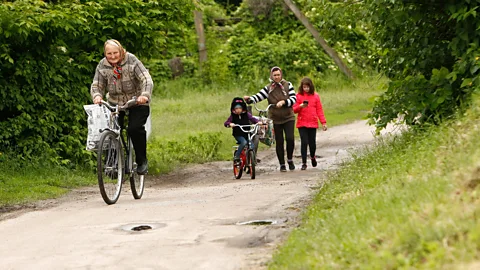How I made my pension sustainable
 K. Victor/Getty
K. Victor/GettySetting up a sustainable pension is one of the most powerful tools we have to minimise our climate footprint. Here Jocelyn Timperley investigates how she can save for her retirement while also saving the planet.
As a journalist whose main beat is climate change, I have come across green pensions fairly often over the years. But I had never got around to actually ensuring my own pension is climate-friendly.
I’m not alone. Even for those taking other kinds of action on climate, ensuring your money, and especially your pension, is aligned with your values and resilient against climate change is often rather far down people's list of priorities. We tend to feel distant from our pensions: we are often automatically enrolled in them and the timeline for receiving the money can be decades away. It's hard to view them as a part of daily life.
And yet pensions are an amazingly powerful tool, with a huge influence on overall investments in the economy. Pension firms invest some $56tn (£41tn) worldwide – that's more than the GDP of the US, China, Japan, and the UK combined. UK pensions alone hold around £2tn in assets, making them "the largest single group of institutional investors in the UK", according to the UK government.
Pensions are also particularly key to steering the direction the world goes in, because they inherently have a long-term view. "For a new person who's just ed a company, age 18 or so, the pension outlook will be way into the middle of this century," says Nick Robins, a professor of sustainable finance at the Grantham Research Institute on Climate Change, at the London School of Economics, UK. "The financial system has lots of people [...] who are thinking short term, but pensions are really long term and therefore can take of issues like climate."
You might also like:
- Our Towards Net Zero series
- Our Carbon Cost series
- How the rich are driving climate change
They are also owned by ordinary people: when you hear about the global finance industry misbehaving, some of that misbehaviour may be on your behalf as a pension holder. "The pension is your money, and you should treat it as such," says Robins. "In a sense it is just as much part of you and your lifestyle as your diet, your travel habits or your housing conditions."
So I decided to finally take the plunge and find out where my pension was invested – and how much power I had to change this. I found there are now some easy swaps I could make to improve things, but also some frustrating difficulties in understanding where exactly my money was invested and barriers to putting it exactly where I wanted it to be.
I also came to the conclusion that greening the pension industry is about far more just swapping our pensions: responsible investment needs to become the norm, not the exception, if we are ever going to tackle climate change.
 Flashpop/Getty
Flashpop/GettyThe power of your pension
As someone who is very worried about climate change and believes personal actions feed into wider societal change, I try to minimise my climate and environmental footprint using the most effective levers I have, such as diet and minimising flying. Until recently, though, I had never acted on my pension.
According to analysis from Aviva, Make My Money Matter and the World Wide Fund for Nature (WWF), moving the average UK pension to a sustainable equivalent reduces some 19 tonnes of greenhouse gas emissions (CO2 equivalent/CO2e) per year, almost three times the average UK carbon footprint. Shifting investment is absolutely key to the green transition, and for many people, moving their pension is the most powerful way to have a direct influence on that shift.
There is a huge change sweeping over the finance industry. Sustainable investment funds and net-zero pledges are becoming commonplace as the pressure rises to act on climate change and investors seek to ready themselves for environmental regulation. "The number of those funds available to investors has increased dramatically over the past five years, and particularly over the last two years," says Lisa Stanley, co-founder of the Good with Money website and author of the Good Guide to Pensions.
According to one analysis, the private sector could deliver 70% of total investments needed to meet net zero goals, but it still has a long way to go. Investment approaches to engaging in this shift, including via pensions, can take several forms. One option is to divest or perform negative screening, where funds exclude specific carbon intensive companies or sectors. Another is to tilt funds more towards companies with higher environmental, social and governance (ESG) ratings. Funds can also use their votes as shareholders to sway company behaviour in a more sustainable direction.
 MARK FELIX/Getty
MARK FELIX/GettyThere's been a rising interest in recent years in the power of pensions to impact the world in both helpful and harmful ways. A key moment was the popular 2017 TED talk by oncologist Bronwyn King. In the talk, King, who had witnessed first-hand the devastating impact on her patients of smoking tobacco, describes her mortification at discovering that her pension, which was sitting in the default fund of her pension scheme, was partly invested in tobacco companies.
"When you invest in a company, you own part of that company," says King in the talk. "You want that company to attract new customers, you want that company to sell more of its products. And when it comes to tobacco, I couldn't think of anything I wanted less."
Richard Curtis, co-founder and director of the Make My Money Matter pension campaign (and screenwriter of romantic comedies such as Notting Hill and Love Actually) began thinking about the power of pensions after watching King's talk. A longtime campaigner, including as the co-founder of the UK charity Comic Relief, his interest in pensions is the next step in a journey of "just generally trying to do the right thing", he says. "Our financial power is the biggest thing we've got to have an effect on business, which self-evidently has to change most."
How to green your pension
I'm 33, so by the time I begin thinking of doing any actual withdrawals from my pension I’ll already know whether or not the world has achieved net-zero emissions by 2050.
How to engage with your pension
This means I'm actually at the perfect age to start thinking about my pension – the money going into it will continue to shape the world I'm living in for decades to come. "Pensions have this strange contradiction," says Curtis, "because you think about them as something to do with older people, but actually, the moment of initial engagement comes when you're young."
Outside environmental and sustainability factors could in turn have a huge impact on my portfolio in the coming decades. "Almost regardless of your values, if companies these days don't actually have a proper plan for net zero emissions, they're going to be increasingly uncompetitive, they're going to be stranded assets, and therefore are going to be a risk," says Robins.
There is a huge lack of knowledge and understanding about pensions. A survey last year from investment fund Hargreaves Lansdown found that a third of UK pension holders don't even know that their pension is invested in the stock market. Curtis says he used to be among them. "I think I just thought, you know, it was in Gringotts and it was slowly growing,” he says. “So lesson number one is pensions are an investment tool. That's what pensions do."
So, how do you actually go about investigating your pension? It's not as complicated as you might think, says Stanley. "It's increasingly easy to move now that everything has gone online. Once you've done it, you think, 'Oh, God, why didn't I do this earlier">window._taboola = window._taboola || []; _taboola.push({ mode: 'alternating-thumbnails-a', container: 'taboola-below-article', placement: 'Below Article', target_type: 'mix' });
